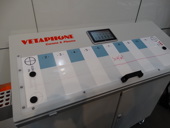Vetaphone Offers Guide to Surface Treatment
- Published: January 23, 2018
KOLDING, DENMARK | Vetaphone, manufacturer of corona and plasma systems, is offering a guide to problems facing today’s narrow web converters. The company says surface treatment has become as integral to quality production as any other part of the printing process. According to Vetaphone CEO Frank Eisby, the process can be split into three clearly definable requirements. 
First, there is the need for simple corona treatment, and this applies to virtually all narrow web press applications. It will typically require a corona unit to deliver a power rating of 1.5–2.0 kW and provide excellent performance on standard substrates run off at low to medium speeds.
The second section has been created by the development of new and more difficult substrates. These are run off on the latest generation of narrow web presses that have been optimized by manufacturers for high-speed production. These factors place an increased demand on the corona unit to deliver the correct dyne level, which typically needs to be rated at 3.0–5.0 kW. To understand this concept, says Eisby, think of the similar situation with UV curing, where dwell time under the lamp, defined by power rating and running speed, are critical to achieving a complete cure.
The third and final section relates to those substrates that have been developed to produce what Eisby calls “unique” labels, typically using special inks and lacquers, lamination, multi-web applications, and other techniques to produce sophisticated products. The chemical constituents of these substrates require a chemical treatment process as well as a physical one—and in these instances plasma treatment is necessary to ensure bonding. Plasma should not be considered as a replacement for corona, says Eisby, more as a logical development of technology to keep pace with the requirements of more sophisticated materials and processes.
Eisby sums up: “With print quality taken as ‘a given’ in today’s market, it is essential that converters appreciate the importance of what can appear to be a minor ancillary process. It’s only as ‘minor’ as expecting a performance car to run properly on low grade fuel. Converters need to wise up on what all their technology can do for them—and not allow surface treatment to be the forgotten element.”
This email address is being protected from spambots. You need JavaScript enabled to view it.




